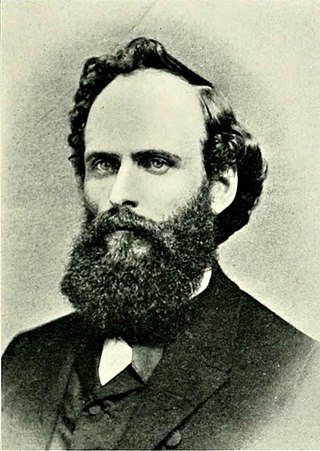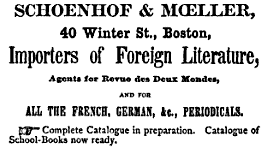Ernst Steiger | |
|---|---|
 | |
| Born | October 4, 1832 |
| Died | August 2, 1917 (aged 84) Sea Gate, Long Island, U.S. |
| Occupation | Bookseller |
Ernst Steiger (October 4, 1832 - August 2, 1917) was an American bookseller, publisher and bibliographer.
Ernst Steiger | |
|---|---|
 | |
| Born | October 4, 1832 |
| Died | August 2, 1917 (aged 84) Sea Gate, Long Island, U.S. |
| Occupation | Bookseller |
Ernst Steiger (October 4, 1832 - August 2, 1917) was an American bookseller, publisher and bibliographer.
Steiger was born in Gastewitz (near Mutzschen) in the Kingdom of Saxony, on October 4, 1832. His father was a farmer. He was apprenticed on February 14, 1848 for five years, to Bernhard Hermann, a bookseller in Leipzig, eventually rising from errand boy to office clerk. In 1853 he moved to Dresden and went to work at the bookshop of W. Türk.
Steiger emigrated in 1855 to New York City to take a position with B. Westermann & Co. (Westermann was Hermann's brother-in-law), in which he became a silent partner.
Having already purchased a periodical business, in 1866 he opened an independent business for himself, as a bookkeeper, importer of German language publications, and eventually publisher. Steiger spoke not only his native German, but also English, French and Spanish, which he had learned as by means of constantly seeking conversations in those languages in his leisure time; and acquired a smattering of several others. He became the publisher of important works of German Americans and of language textbooks, and also a manufacturer and importer of materials for the newly imported Kindergarten system. Steiger was the author of Der Nachdruck in Nordamerika (New York, 1860); Das Copyright-Law in den Vereinigten Staaten (1869); and Periodical Literature, a bibliography (1873), and The Periodical Literature of the United States of America: With Indexes and Appendices, as well as the Steiger's Educational Directory series.
By 1898, he was the recipient of the Prussian Order of the Crown and the Imperial Austrian Order of Franz Joseph. [1] [2]
He died August 2, 1917, at his summer home at Sea Gate, Long Island. He was survived by a wife, his son Ernst Jr. and three daughters. Ernst Jr. and one of his sisters were by then partners in E. Steiger & Co. [3]

George Stillman Hillard was an American lawyer and author. Besides developing his Boston legal practice, he served in the Massachusetts legislature, edited several Boston journals, and wrote on literature, politics and travel.

Ephraim George Squier, usually cited as E. G. Squier, was an American archaeologist, history writer, painter and newspaper editor.

William Chambers of Glenormiston was a Scottish publisher and politician, the brother of Robert Chambers. The brothers were influential in the mid-19th century, in both scientific and political circles.
Tuttle Publishing, originally the Charles E. Tuttle Company, is a book publishing company that includes Tuttle, Periplus Editions, and Journey Editions. A company profile describes it as an "International publisher of innovative books on design, cooking, martial arts, language, travel and spirituality with a focus on China, Japan and Southeast Asia." Many of its books on Asian martial arts, particularly those on Japanese martial arts, were the first widely read publications on these subjects in the English language.

James Grant Wilson was an American editor, author, bookseller and publisher, who founded the Chicago Record in 1857, the first literary paper in that region. During the American Civil War, he served as a colonel in the Union Army. In recognition of his service, in 1867, he was nominated and confirmed for appointment as a brevet brigadier general of volunteers to rank from March 13, 1865. He settled in New York, where he edited biographies and histories, was a public speaker, and served as president of the Society of American Authors and the New York Genealogical and Biographical Society.

Sampson Low was a bookseller and publisher in London in the 19th century.

Karl Ernst Jarcke was a German publisher and professor of criminal law, who took a conservative stance towards revolutionary movements in the early nineteenth century.

Edward Payson Evans was an American scholar, linguist and early advocate for animal rights. He is best known for his 1906 book on animal trials, The Criminal Prosecution and Capital Punishment of Animals.

David Nutt was a British book publisher and bookseller.
Adolph Ernst Kroeger was a translator and author who contributed significantly to the understanding of German literature in the United States.

Rossiter Johnson was an American author and editor. He edited several encyclopedias, dictionaries, and books, and was one of the first editors to publish "pocket" editions of the classics. He was also an author of histories, novels, and poetry. Among his best known works was Phaeton Rogers, a novel of boyhood in Rochester, New York, where Johnson was born.
Hispania is a peer-reviewed academic journal and the official journal of the American Association of Teachers of Spanish and Portuguese. It is published quarterly by the AATSP and covers Spanish and Portuguese literature, linguistics, and pedagogy. Hispania publishes in literature, linguistics, and pedagogy having to do with Portuguese- and Spanish-speaking communities, as well as book/media reviews, which are subdivided into Pan-Hispanic/Luso-Brazilian Literary and Cultural Studies, linguistics, language, media, and fiction and film.

Carl Schoenhof was a bookseller and publisher in Boston, Massachusetts, in the 19th century. He specialized in foreign books. Born in Carlsruhe, Germany, he attended University of Heidelberg. He moved to the U. States around 1864. Shortly thereafter he worked for Boston publishers DeVries, Ibarra & Co., and took over the business in 1870. His business ventures included Schoenhof & Moeller, Cupples & Schoenhof, and Schoenhof Book Co. (ca.1890s).

Frederick Leypoldt was a German-American bibliographer, the founder of Library Journal, Publishers Weekly, Index Medicus and other publications.

Samuel Kneeland (c.1696–1769) was an American printer and publisher of The Boston Gazette and Weekly Journal. Kneeland obtained much of his work printing laws and other official documents for the Province of Massachusetts Bay colonial government for about two decades. He printed the first Bible in the English language ever produced in the American colonies, along with many other religious and spiritual works, including the Book of Psalms. He was also noted for introducing a number of innovations to newspaper printing and journalism. He was one of many colonial printers who were strongly opposed to and outspoken against the Stamp Act in 1765. Kneeland, primarily, along with his sons, were responsible for printing the greater majority of books, magazines and pamphlets published in Boston during his lifetime.

Johann Friedrich Vieweg was a German publisher and the founder of Vieweg Verlag.
David Alphonso Talboys was an English bookseller, known as a publisher, translator, and local politician.
As of 2018, ten firms in Germany rank among the world's biggest publishers of books in terms of revenue: C.H. Beck, Bertelsmann, Cornelsen Verlag, Haufe-Gruppe, Holtzbrinck Publishing Group, Ernst Klett Verlag, Springer Nature, Thieme, WEKA Holding, and Westermann Druck- und Verlagsgruppe. Overall, "Germany has some 2,000 publishing houses, and more than 90,000 titles reach the public each year, a production surpassed only by the United States." Unlike many other countries, "book publishing is not centered in a single city but is concentrated fairly evenly in Berlin, Hamburg, and the regional metropolises of Cologne, Frankfurt, Stuttgart, and Munich."
Henry Kernot was an English-born American bookseller, author, cataloguer, and publisher. He authored Bibliotheca Diabolica, an annotated bibliography of books about the devil, in 1874.